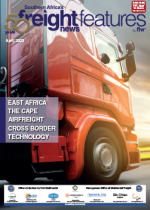Demand for road transport continues to grow across southern Africa as cargo owners realise the advantages of moving goods across borders via road, said Tiago Pocinho, Rangel Logistics Solutions country manager for South Africa and Zambia.“The Covid-19 pandemic, along with electronic commerce and commercial partnerships between sub-Saharan African countries, brought a series of changes to international transport and trade that are still being felt today. “During the pandemic crisis, land transport experienced major growth, as it proved to be faster, more versatile and sometimes more cost-effective. “Currently, although the global health situation has normalised, exporters still feel the significant advantages of road transport, and as such, it maintains its growth to the detriment of air and sea transport,” he told Freight News. “Also contributing to this continued demand for land transport are the existing constraints in the ports, since the pandemic led to a labour shortage that has yet to be recovered, as well as a shortage of shipping containers that is gradually starting to recover.”He said these variables were magnified on the African continent, given the large number of countries without their own ports and which are further burdened by weak rail and air infrastructure. All rely on road transport.“This trend towards land transport allows the market to fulfil its need for ‘ just in time cargo’, which aims to maintain larger stocks to supply all possible needs,” explained Pocinho.He said another area of growth had been an increase in routes across southern Africa. “Road transport is more and more the option most desired by the clients, because it allows the cargo to reach its final destination faster. “In this sense, at Rangel we have been increasingly focusing on corridors that are not so common, offering the necessary solutions to our customers. This has seen us increase our routes between South Africa and Angola, as well as in routes to the DRC and Tanzania.”Pocinho said the lack of infrastructure remained one of the biggest obstacles. In South Africa, loadshedding is a major challenge. “Cutting the power supply during some periods of the day can hinder logistics operations. “On the other hand, and the most critical, we have the waiting times for customs clearance, with goods often having to wait for long periods at the borders.”He said with this in mind, Rangel had strategically positioned itself at several important frontiers for international trade, namely in Angola, South Africa, Mozambique, Zambia and Tanzania. “This way we try to mitigate possible delays by using our freight forwarder who will ensure that all documentation is dealt with promptly, and pre-clearing the goods to speed up the f low of cargo across borders.”Pocinho said the outlook for the cross-border sector was extremely positive, with predictions of more growth on the cards. “We believe we will continue to see an increase in cross-border transportation not only because of the market trend itself but also due to the growth that the company has had in the past year.”

